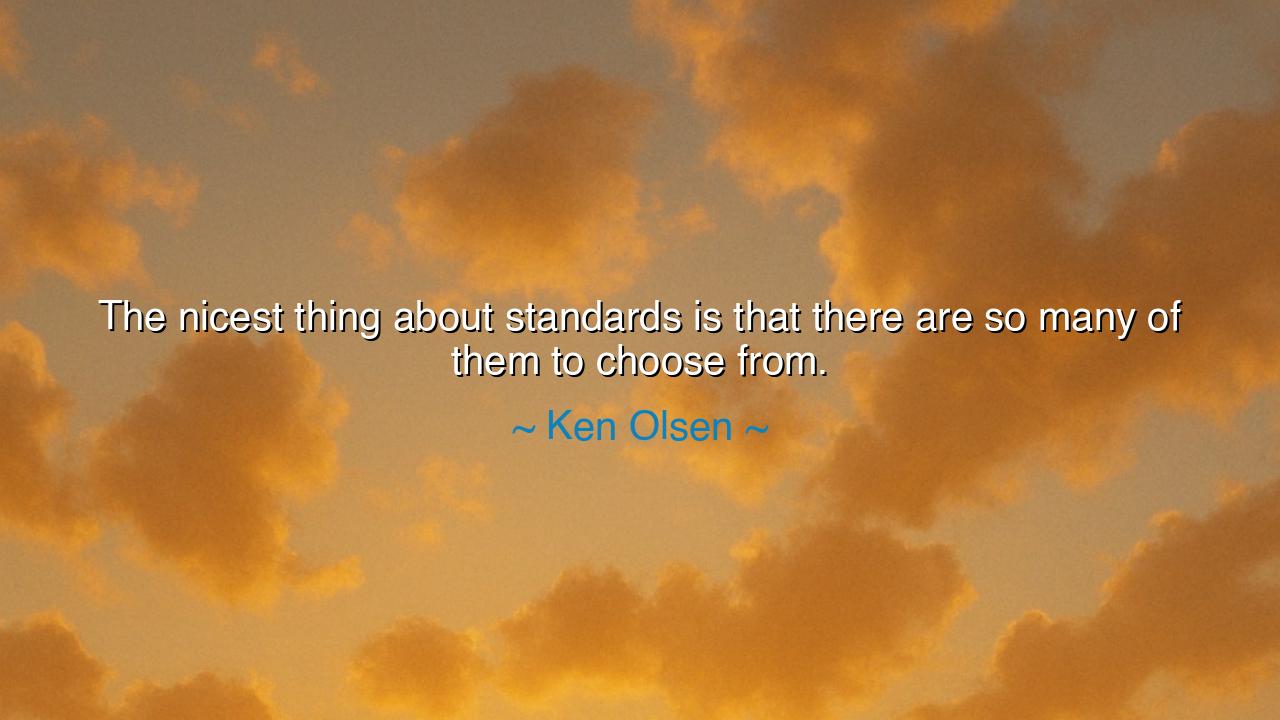
The nicest thing about standards is that there are so many of






“The nicest thing about standards is that there are so many of them to choose from.” Thus spoke Ken Olsen, the visionary founder of Digital Equipment Corporation, a pioneer in the dawn of the computer age. His words, though clothed in humor, conceal within them a sharp and timeless truth about the nature of progress, human invention, and the paradox of choice. For Olsen, who stood at the threshold of the technological revolution, understood that in the realm of innovation, standards—those agreed-upon systems that promise unity—can sometimes become the very instruments of division. He saw with a keen eye that mankind, ever eager to improve, often builds too many ladders to reach the same sky.
To the ancients, a standard was a banner—something raised high to unite warriors on the battlefield. It signified one cause, one people, one purpose. But in the modern age, standards are not only flags of unity; they are walls of distinction. Every field—be it science, language, art, or technology—has birthed its own multitude of standards, each claiming perfection, each promising clarity. Yet in their abundance, confusion often reigns. For when too many banners rise, who shall the people rally behind? When too many systems claim supremacy, the harmony of the world turns to discord. Olsen, with wit and wisdom, revealed this irony: that man, in his pursuit of order, often multiplies complexity.
The origin of this saying lies in the early years of computing, when engineers and dreamers sought to build the foundations of a digital world. Yet instead of one unified road, countless paths emerged. Every company, every nation, every mind created its own “standard”—its own method, language, or protocol. What was meant to connect mankind instead divided it. Machines could not speak to one another, systems clashed, and the world learned that progress without collaboration is but a tower of Babel. Olsen, witnessing this chaos, smiled upon it—not in despair, but in recognition of human nature itself. For he knew that even in our folly, there is creativity; even in our disagreements, there is growth.
Consider the story of Nikola Tesla and Thomas Edison, two giants who once waged the “War of the Currents.” Edison championed direct current (DC), while Tesla fought for alternating current (AC). Each claimed his system was the true standard for electrifying the world. Their conflict divided investors, scientists, and cities. But in the end, the world found wisdom in balance—adopting one, learning from the other, and shaping a future that bore traces of both. This tale, echoing Olsen’s words, reminds us that the multitude of standards, though burdensome, can also be the crucible of innovation. For from the clash of ideas, stronger ideas are born.
And yet, the deeper wisdom of Olsen’s saying lies not in the realm of machines alone, but in the realm of men. For in life, as in technology, we are surrounded by countless “standards”—codes of conduct, traditions, beliefs, and expectations. Every culture, every community, every individual claims their own measure of what is right and good. Some follow the standard of wealth, others of virtue; some of freedom, others of obedience. We are tempted to believe ours alone is true. But the wise, seeing as Olsen saw, recognize that the world is vast, and there are many standards to choose from. The challenge is not to mock this diversity, but to find within it the thread of understanding that binds us all.
The humor of Olsen’s words conceals a gentle admonition: choose your standard with care. For not every measure is noble, not every path leads to wisdom. Too many choices can paralyze the soul, but the one who chooses with clarity of purpose—who aligns his standard with truth and compassion—finds peace amid the noise. Just as a craftsman must pick one tool from many, so must each of us choose one guiding principle from the multitude. The power lies not in having many standards, but in knowing which one deserves our loyalty.
Therefore, O seeker of wisdom, when you stand amidst the multitude of voices—each proclaiming its own truth, its own law, its own perfection—remember Olsen’s insight. Do not be overwhelmed by the abundance of standards. Rather, see in them the reflection of humanity’s boundless creativity, its struggle to define meaning. Choose your principles not by ease or popularity, but by the light they cast upon your path. Then, having chosen, follow steadfastly, and let your actions become a new and worthy standard for others to behold.
The lesson is clear: The world will always offer many ways, many rules, many “standards.” Some will dazzle, others will divide. But the wise man does not chase them all; he discerns, selects, and builds upon the best of them. For though there are many standards to choose from, the truest standard is that which uplifts the soul, unites the people, and serves the good of all. Thus, as Ken Olsen taught with both irony and insight, even in a world of endless choices, the noblest standard is the one that leads us closer to harmony.






AAdministratorAdministrator
Welcome, honored guests. Please leave a comment, we will respond soon